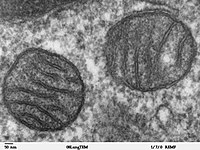
Photo from wikipedia
Mitochondria are complex endosymbionts that evolved from primordial purple nonsulfur bacteria. The incorporation of bacteria-derived mitochondria facilitates a more efficient and effective production of energy than what could be achieved… Click to show full abstract
Mitochondria are complex endosymbionts that evolved from primordial purple nonsulfur bacteria. The incorporation of bacteria-derived mitochondria facilitates a more efficient and effective production of energy than what could be achieved based on previous processes alone. In this case, endosymbiosis has resulted in the seamless coupling of cytochrome c oxidase and F-ATPase to maximize energy production. However, this mechanism also results in the generation of reactive oxygen species (ROS), a phenomenon that can have both positive and negative ramifications on the host. Recent studies have revealed that neuropsychiatric disorders have a pro-inflammatory component in which ROS is capable of initiating damage and cognitive malfunction. Our current understanding of cognition suggests that it is the product of a neuronal network that consumes a substantial amount of energy. Thus, alterations or perturbations of mitochondrial function may alter not only brain energy supply and metabolite generation, but also thought processes and behavior. Mitochondrial abnormalities and oxidative stress have been implicated in several well-known psychiatric disorders, including schizophrenia (SCZ) and bipolar disorder (BPD). As cognition is highly energy-dependent, we propose that the neuronal pathways underlying maladaptive cognitive processing and psychiatric symptoms are most likely dependent on mitochondrial function, and thus involve brain energy translocation and the accumulation of the byproducts of oxidative stress. We also hypothesize that neuropsychiatric symptoms (e.g., disrupted emotional processing) may represent the vestiges of an ancient masked evolutionary response that can be used by both hosts and pathogens to promote self-repair and proliferation via parasitic and/or symbiotic pathways.
Journal Title: Frontiers in Pharmacology
Year Published: 2023
Link to full text (if available)
Share on Social Media: Sign Up to like & get
recommendations!